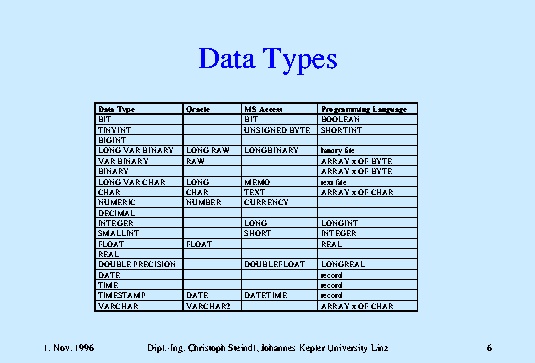Is Interoperability Achievable with ODBC?: Slide 6 of 10.
Click slide for next, or goto previous, first, last slides or back to thumbnail layout.

Click slide for next, or goto previous, or back to thumbnail layout.
ODBC defines some data types. We will call these data types ODBC types.
There are predefined data types for character data, for numeric data and for time and date. These data types are used both for data definition (like in a CREATE TABLE statement) and for data manipulation (like in INSERT, UPDATE, and SELECT statements).
Unfortunately, not all databases support all the ODBC types, and if they support them, they often use different names . We will call the data types supported by databases database types).
Additionally the programming language in use typically only supports a different set of data types. We will call these data types application types.
This table gives a flavor of the variety of data type names. Blank fields indicate not-supported data types.
Not only do the names of the data types differ, but also their parameters when used for data definition. For example, ODBC defines a string of 32 characters as CHARACTER(32) while MS Access calls it just TEXT without parameters.
This makes an application program effectively dependent on the underlying database. Using a different DBMS requires adaptation of the Sequel statements and a recompilation of the application.
